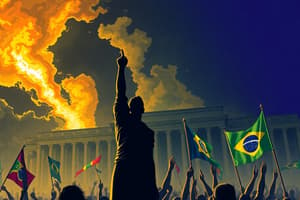Podcast
Questions and Answers
Quem foi o primeiro presidente civil eleito após o Marechal Floriano Peixoto?
Quem foi o primeiro presidente civil eleito após o Marechal Floriano Peixoto?
- Campos Salles
- Prudente de Morais (correct)
- Getúlio Vargas
- Júlio Prestes
O que significa a palavra oligarquia?
O que significa a palavra oligarquia?
- Governo de muitos
- Governo de poucos (correct)
- Governo de nenhum
- Governo de todos
Quais partidos políticos estavam presentes durante a oligarquia?
Quais partidos políticos estavam presentes durante a oligarquia?
- Partido Republicano do Rio Grande do Sul e Partido Conservador
- Partido Republicano Paulista e Partido Republicano Mineiro
- Partido Republicano Paulista e Partido Conservador (correct)
- Partido Republicano Mineiro e Partido Conservador
Quem foi o candidato derrotado nas eleições de 1930?
Quem foi o candidato derrotado nas eleições de 1930?
Quando ocorreu a Revolução de 1930?
Quando ocorreu a Revolução de 1930?
Quais foram as principais mudanças na forma de governar após a Revolução de 1930?
Quais foram as principais mudanças na forma de governar após a Revolução de 1930?
Qual foi o período de governo de Campos Salles?
Qual foi o período de governo de Campos Salles?
Quais eram os principais grupos oligárquicos do Brasil na década de 1890?
Quais eram os principais grupos oligárquicos do Brasil na década de 1890?
Quem foi o presidente eleito após Prudente de Morais?
Quem foi o presidente eleito após Prudente de Morais?
Qual é a característica mais comum de uma oligarquia?
Qual é a característica mais comum de uma oligarquia?
Flashcards are hidden until you start studying
Study Notes
-
The oligarchy in Brazil during the 1890s and early 1900s was characterized by the alternating of power between the coffee oligarchies of Minas Gerais and São Paulo.
-
The presidents of this era were usually elected by the Paulista Republican Party and the Mineiro Republican Party.
-
From the 1930s onwards, some historians call this period the First Republic, the Old Republic, or the Republic of Coffee and Milk.
-
The word oligarchy comes from the Greek and means "government of few." An oligarchy is a government that is dominated by a group of people or families who are united by the same economic activity or political party.
-
As oligarchies form closed groups that reject any form of different thought, even in democracy, it is possible for there to be cases of oligarchic government.
-
During the oligarchy, there were no national political parties as there are today, only state parties.
-
The exception was the Conservative Party of Rio Grande do Sul, which had support in the north and northeast of Brazil.
-
Despite not being able to elect a president, the Republican Party of Rio Grande do Sul was very important in Brazilian politics.
-
Prudente de Morais was the first civilian president elected after Marshal Floriano Peixoto, and his term lasted from 1894 to 1898.
-
Campos Salles was the president elected after Morais and served from 1898 to 1898.
-
Getúlio Vargas was the candidate who was defeated in the 1930 elections and he became the dictator of Brazil in 1931.
-
With the 1930 Revolution, other social actors enter the political scene, changing some of the ways government was conducted.
Studying That Suits You
Use AI to generate personalized quizzes and flashcards to suit your learning preferences.





